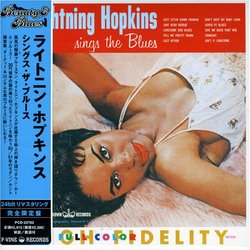Very good blues album, Recommended
Andersson, Christer | Sweden | 08/30/2007
(5 out of 5 stars)
"Sam "Lightnin'" Hopkins was born on March 15, 1912 in Centerville, Texas. In 1920, Hopkins met and -- at age 8 -- played with the legendary Blind Lemon Jefferson. For a short time, he later became Jefferson's guide. Hopkins' cousin, the great Texas bluesman Texas Alexander, was another influence as Hopkins played with Alexander. That partnership was broken up by Hopkins' time in Houston's County Prison Farm during the 30s.
When Hopkins made his way to Houston's Third Ward in 1946, he was introduced to Lola Anne Cullum, a talent scout who had pieced together deals with companies such as Alladin Records out of Los Angeles. She paired up Hopkins with a piano player by the name of Wilson "Thunder" Smith and came up with the name "Lightnin'" as an obvious match. It stuck.
Hopkins had no little success with Katie May, cut on November 9, 1946. After that came a series on the Alladin label -- Shotgun Blues, Short Haired Woman, Abilene and Big Mama Jump. The blues floodgate had opened. What followed was thirty plus years of albums on everything from small, obscure labels to big ones. The list includes Modern/RPM, Gold Star, Mercury, Jax, Decca and Herald. During this period he cut some of the most ferocious blues guitar mixed with what he told me were "air songs," meaning those where he'd just pull the lyrics right out of the air on the spot.
Hopkins' career faded until a folklorist by the name of Mack McCormick rediscovered Hopkins and presented him under the growing label of "folk artist." It made no different to Lightnin' what they called him, he played as he always had, working with Sam Charters on Folkway Records in 1959. The groundbreaking solo album was recorded by Charters in Hopkins' apartment on a borrowed guitar. Again, Hopkins' career was off and running "like a turkey through the corn."
More albums than can be counted followed, including those on labels such as Candid, Arhoolie, Prestige, Verve, Jewel, World Pacific, Bluesville, Fire and Vee-Jay. For an upfront fee, the whiskey or gin flavored albums were often recorded by tiny, obscure one-person labels. Since Hopkins had the gift of the air song, he had no shortage of material. The songs would range from intense, deep tissue blues to some of the more surrealistic ever recorded as he reached for rhymes.
The archetypal story of Hopkins as a performer supposedly involved Billy Gibbons of ZZ Top, then a young kid in a band around the corner from my band's garage -- The Moving Sidewalks. Supposedly, Gibbons heard Hopkins play at a coffeehouse and muttered, "He doesn't even know when to change chords." Hopkins was standing behind Gibbons, according to the story, and leaned forward and surprised the teenager with, "Lightnin' change when Lightnin' want to."
Indeed, Hopkins had a bag of licks and patterns that fit largely into two divisions -- slow E and Fast E (with an occasional venture into A). His rhythm and the chord changes go with his feelings at that moment in time and, as such, made it difficult for other musicians to follow. With a few exceptions, his solo recordings later in his life have that quirky sense to them and work well as opposed to hired bands that became hopelessly entangled, to quote a Hopkins song, "like a ball of twine."
Hopkins didn't do much of in the way of recording after 1974, his health fragile. I saw him one night at the Jewish Community Center in Houston where he performed a concert for a small, polite group in theater style seating. He played well, but the audience was polite and reserved. A half hour into the concert, in came a relative of Hopkins' -- I believe it was an elderly (even compared to Lightnin) uncle. The old man sat down on the front row and, with that, Hopkins seemed to come alive. The audience seemed to wake up as well and it moved into a rollicking evening.
Shortly later, Hopkins died in Houston on January 30, 1982.
[All tracks was recorded in Houston 1949-1950]
01. Jake Head Boogie
02. Lonesome Dog Blues
03. Tell Me Pretty Mama
04. Last Affair
05. Don't Keep My Baby Long (Original Master Take)
06. Santa Fe
07. Give Me Back That Wig
08. Beggin' You To Stay (Someday Baby)
09. Bad Luck & Trouble
10. Ticket Agent
11. War News Blues
12. Everyday I Have The Blues
13. Needed Time
14. One Kind Favor
15. Black Cat
16. Some Day Baby"


 Track Listings (16) - Disc #1
Track Listings (16) - Disc #1